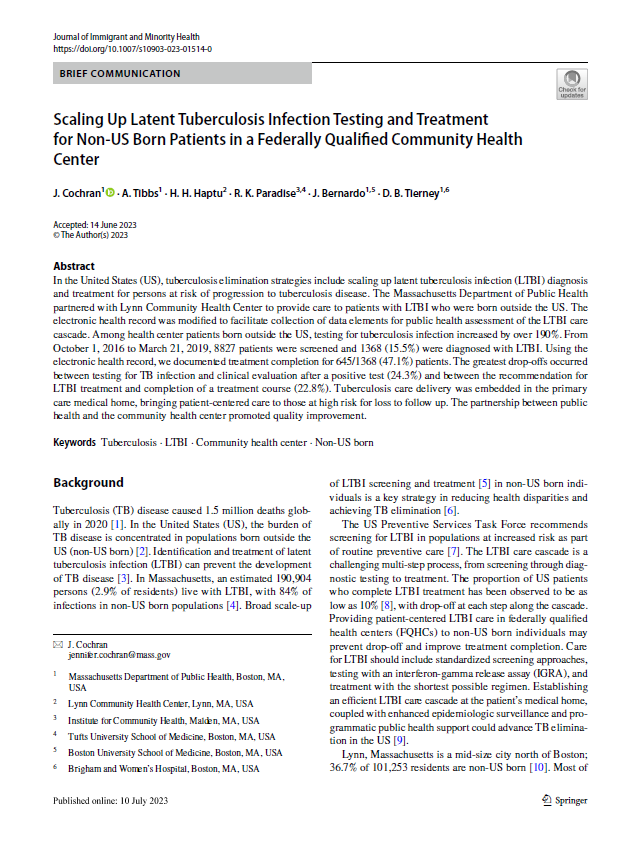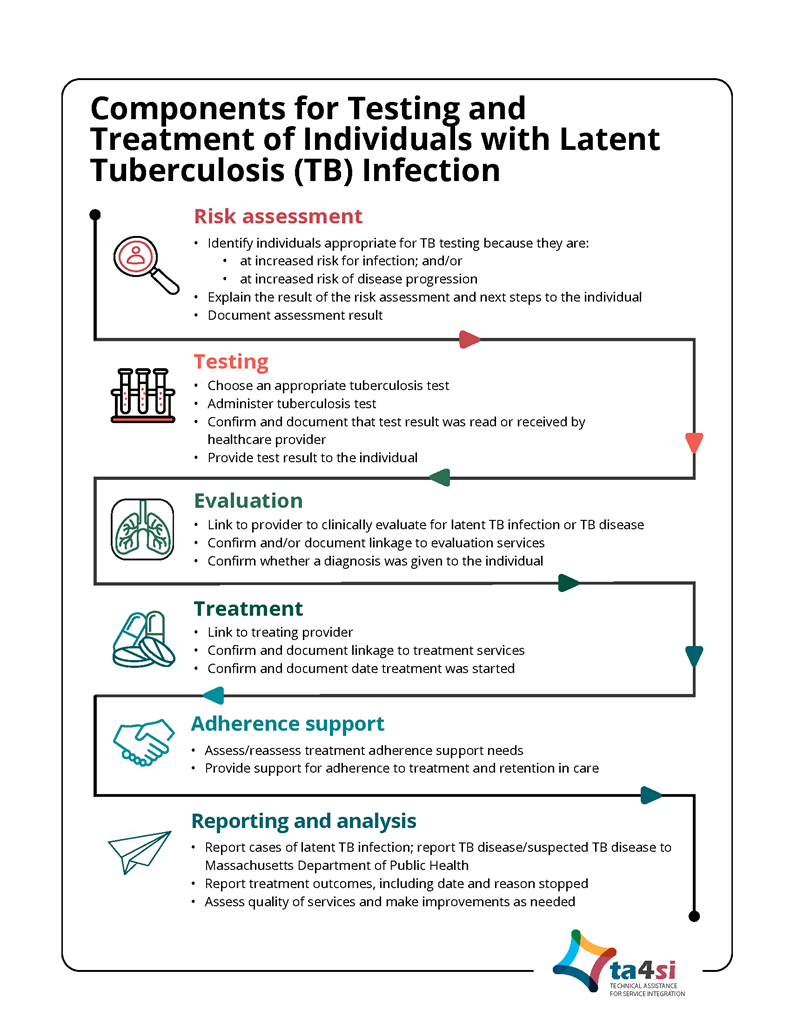Latent TB Infection
The following resources are designed to support clinical and non-clinical staff from agencies in Massachusetts that provide latent TB infection services. This page includes links to recommended tools and resources as well as past webinars. Many of these agencies are moving away from referring patients out for latent TB infection screening and treatment services and looking to systematically provide these services, including internal evaluation, testing, treatment and/or linkage to care.
Spotlight: New publication!

Check out the June 2023 publication from the Massachusetts Department of Public Health, Lynn Community Health Center, and their partners, Scaling Up Latent Tuberculosis Infection Testing and Treatment for Non‑US Born Patients in a Federally Qualified Community Health Center. The article highlights their work from a demonstration project funded by the Centers for Disease Control and Prevention. The project embedded TB care in a primary care medical home model, supporting those at high risk for loss to follow up.
Components for Testing and Treatment of Individuals with Latent Tuberculosis (TB) Infection
This page provides resources for agencies in Massachusetts that provide latent tuberculosis (TB) infection services. Clinical and non-clinical providers will find resources that address each component in the cascade of care for latent TB infection, including risk assessment, testing, evaluation, treatment, adherence support, and reporting and analysis. In addition, there are resources that provide information on related topics such as an introduction to latent TB infection; process mapping; and billing. If you have any questions about the resources on this page, please contact the IDTA team.
The accompanying graphic depicts the components for the testing and treatment of individuals with latent TB infection. This graphic gives an overview of the components of latent TB infection services, including steps to deliver each component to your clients. These components are not mutually exclusive and individual agencies may offer all or some of these components in their menu of services.
Fact Sheets
The following is a series of Fact Sheets on key components of latent TB infection service delivery. Click the links to view or download a PDF of each Fact Sheet.
Note: These Fact Sheets are intended to serve as a resource for agencies receiving funding from the Massachusetts Department of Public Health (MDPH), Bureau of Infectious Disease and Laboratory Sciences (BIDLS) to provide infectious disease services, including TB testing and latent TB infection services through the HIV/HCV/STI/TB Prevention, Linkage, and Retention in Care and Treatment Request for Response (DPH RFR Document Number: 181926).
Introduction: Latent Tuberculosis Infection
Download Introduction
This resource provides an introduction to latent TB infection for clinical and non-clinical staff from agencies in Massachusetts that provide latent TB infection services. It includes links to tools and resources, as well as information about:
- What is latent TB infection?
- What is the difference between latent TB infection and TB disease?
- How common are latent TB infection and TB disease?
- Why is testing for and treating latent TB infection important?
- What are the components for the testing and treatment of latent TB infection?
- Where can I get more information about latent TB infection?
Component A: Risk Assessment
Download Component A
This resource provides an overview of how to identify individuals at increased risk of TB infection. It is intended for clinical and non-clinical staff from agencies in Massachusetts that provide latent TB infection services. It includes links to tools and resources, and provides answers to questions including:
- What puts someone at increased risk for TB infection?
- What tools can my agency use to identify individuals at increased risk?
- I’ve identified someone at increased risk, what are the next steps?
- How should I communicate with individuals about risk for latent TB infection?
- What data considerations should I be aware of for linking individuals to TB evaluation services?
Component B: Testing
Download Component B
This resource provides an overview of diagnostic tests for TB infection for clinical and non-clinical staff from agencies in Massachusetts that provide latent TB infection services. It includes links to tools and resources, and provides answers to questions, including:
- What is the purpose of a TB test?
- What TB tests are available and how do they work?
- Where can I find more information on testing for TB infection?
- What are the next steps after TB testing is completed?
- What messages should I give to individuals about testing for TB infection?
- What data considerations should I be aware of for testing individuals for TB?
Component C: Evaluation
Download Component C
This resource provides an overview of linking individuals to TB evaluation services for providers who do not provide these services themselves. It is intended for clinical and non-clinical staff from agencies in Massachusetts that provide latent TB infection services. It includes links to tools and resources and provides answers to questions including:
- When should an individual be linked to TB evaluation services?
- What steps are part of a TB evaluation?
- Where can individuals get a TB evaluation?
- What needs to happen after the TB evaluation?
- How should I communicate with individuals about TB evaluation services?
- What data considerations should I be aware of for linking individuals to TB evaluation services?
Component D: Treatment
This resource provides an overview of linking individuals to TB treatment services for providers who do not provide these services themselves. It is intended for clinical and non-clinical staff from agencies in Massachusetts that provide latent TB infection services. It includes links to tools and resources, and provides answers to questions including:
- When should an individual with latent TB infection be linked to TB treatment services?
- What are some key considerations for clinical and non-clinical providers when linking individuals to treatment for latent TB infection?
- Which populations have specific considerations I should be aware of when linking individuals to treatment services?
- Where can individuals be treated?
- How should I communicate with individuals about treatment for latent TB infection?
- What data considerations should I be aware of for linking individuals with latent TB infection to treatment services?
Component E: Adherence Support
This resource provides an overview of medication adherence support for latent TB infection. It is intended for clinical and non-clinical staff from agencies in Massachusetts providing latent TB infection services. The following topics will be discussed:
- What is adherence support for latent TB infection?
- Why is adherence support important?
- What key considerations should I know to manage adherence support for latent TB infection?
- How should I communicate with individuals about adherence support?
- What are best practices to support individuals to adhere to treatment for latent TB infection?
- What data considerations should I be aware of for providing adherence support to individuals on latent TB infection treatment?
Component F: Reporting and Analysis
This resource provides an overview of conducting reporting and analysis for any component of latent TB infection services. It is intended for clinical and non-clinical staff from agencies in Massachusetts providing latent TB infection services. It includes links to tools and resources and provides answers to questions including:
- What do I need to know about reporting and tracking data for latent TB infection services and how does this relate to tracking indicators?
- What is the difference between “required” data and “recommended” data?
- Where should I record required data on latent TB infection services?
- Where can I learn more about reporting data on latent TB infection services to BIDLS/MDPH?
- What are important considerations for managing data safely and protecting the confidentiality of individuals receiving services?
- How will MDPH give me feedback on the data I’ve reported?
- What specific data for latent TB infection services does my agency need to know about for reporting and analysis?
Billing Component
This resource provides an overview of billing and insurance for latent TB infection services. It is intended for clinical and non-clinical staff from agencies in Massachusetts providing latent TB infection services. It includes information and links for more information on the following questions:
- What services does my agency’s contract with the Massachusetts Department of Public Health (MDPH) fund?
- How do the recommendations from the United States Preventive Services Task Force affect payment for latent TB infection services?
- What services do I need to bill an individual’s insurance for
- What codes should I use to bill for TB testing?
- What alternatives are available for funding latent TB infection services for uninsured individuals?
- Where can I find more information on billing and insurance for latent TB infection services
Process Mapping Questions for Latent TB Infection
This resource provides an overview of how to develop a process map for each component of latent TB infection services. Before implementing latent TB infection services, your agency will need to develop procedures to carry out each component and determine how these new services will fit into your workflow. For each component, think about all of the actions needed to carry out services, including how these actions link together and what is needed to start and complete each action or part of the component. Key questions to ask for each component as you develop these procedures are listed in the resource. As you answer these questions, your agency can develop a process map for the new service component you’ll be providing.
Resources List
This document contains lists of resources relevant to latent tuberculosis (TB) infection for use by providers at clinical and community-based organizations in Massachusetts. These resources were identified by the Infectious Disease Technical Assistance (IDTA) project in the course of developing a series of Fact Sheets on latent TB infection services.
Virtual Provider Learning Sessions for Latent Tuberculosis (TB) Infection
- Risk assessment and Testing
- Adherence Support
- Reporting and Analysis

